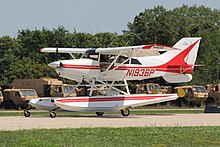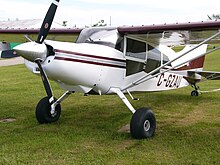Maule M-7
| M-7, MX-7, MXT-7 | |
|---|---|

| |
| Maule M-7 | |
| Role | Utility aircraft |
| National origin | United States |
| Manufacturer | Maule Air |
| Designer | Belford Maule |
| First flight | 1984 |
| Number built | ca. 500 by 1995 |




The Maule M-7 is a family of single-engine light aircraft that has been manufactured in the United States since the mid-1980s.
Design and development
[edit]Based on the Maule M-4, it is a high-wing, strut-braced monoplane of conventional configuration, available with tailwheel or optional tricycle wheeled undercarriage[1] and frequently used as a floatplane with twin floats. The basic M-7 has a longer cabin than its predecessors the M-5 & M-6, with two seats in front, a bench seat for up to three passengers behind them, and (like the M-6) an optional third row of "kiddie seats" at the rear.[2] Extra cabin windows can be fitted if the "kiddie seats" are to be used. The MX-7 uses the same fuselage as the M-6,which is a modified M-5 fuselage but the same wing span as the M-5,[2][3] and incorporates the increased fuel tankage, Hoerner-style wingtips and five-position flaps designed for the M-7.[4]
The M-7 family has been produced both with piston and turboprop engines.[2][3][5]
Variants
[edit]M-7 series
[edit]- M-7-235 Super Rocket
- Similar to M-6-235 with lengthened cabin. Tailwheel undercarriage and Lycoming O-540 engine[2]
- M-7-235B Super Rocket[6]
- Same as M7-235 including Oleo-Strut main landing gear.
- M-7-235C Orion[6]
- Same as M7-235B but with sprung aluminum main landing gear and Lycoming IO-540 engine.
- M-7-260[6]
- M-7-260C[6]
- M-7-420 Starcraft Turboprop
- M-7-235 with Allison 250 turboprop engine[2]
- MT-7-235 Tri-Gear
- Super Rocket with tricycle undercarriage[2]
- MT-7-260[6]
MX-7 series
[edit]- MX-7 Rocket[6]
- MX-7-160 Sportplane
- M-6 fuselage with M-5 wings. Lycoming O-320 engine[2][6]
- MX-7-180 Star Rocket
- MX-7 with lengthened cabin. Optional third row of seats with windows. Lycoming O-360 engine[2]
- MX-7-180A Sportplane and Comet
- MX-7-180B Star Rocket[6]
- MX-7-180C Millennium[6]
- MX-7-250 Starcraft
- MX-7 with Allison 250 turboprop engine[2]
- MX-7-420 Starcraft Turboprop
- MX-7-235 with Allison 250 turboprop engine[2]
- MXT-7-160 Comet
- MX-7-160 with tricycle undercarriage
- MXT-7-180 Star Rocket
- MX-7-180 with tricycle undercarriage[2]
Specifications (M-7-235B)
[edit]Data from manufacturer[7] and FAA[8]
General characteristics
- Crew: one
- Capacity: four passengers
- Length: 23.67 ft (7.21 m)
- Wingspan: 32.92 ft (10.03 m)
- Height: 6.33 ft (1.93 m)
- Empty weight: 1,549 lb (703 kg) typical, equipped
- Gross weight: 2,500 lb (1,134 kg)
- Fuel capacity: 40 U.S. gallons (150 L; 33 imp gal) usable (standard)
- Powerplant: 1 × Lycoming O-540-J1A5D six cylinder, horizontally-opposed, air-cooled aircraft engine, 235 hp (175 kW)
- Propellers: 2-bladed Hartzell Propeller HC-C2YR-1BF/F8468A-6R constant speed propeller
Performance
- Cruise speed: 147 mph (237 km/h, 128 kn) maximum structural cruising speed
- Stall speed: 49 mph (80 km/h, 43 kn) flaps down
- Never exceed speed: 182 mph (293 km/h, 158 kn)
- g limits: +3.8/-1.5 g
Notes
[edit]- ^ Maule Air (1 January 2012). "Standard Equipment – MX(T)-7 Series and M(T)-7 Series Maule Aircraft" (PDF). Retrieved 17 June 2012.
- ^ a b c d e f g h i j k Simpson 1995, 242
- ^ a b Jane's All the World's Aircraft 1985–86, 448
- ^ "Private Aircraft Buyers' Guide" 1986, 39.
- ^ "Maule develops turboprops" 1987, 16
- ^ a b c d e f g h i World Aircraft Information Files, File 901 Sheet 08
- ^ "Maule M-7-235B Flight Manual" (PDF). Maule Aircraft. Maule Aerospace Technology, Inc. 7 June 2018. Archived from the original (PDF) on 3 May 2020. Retrieved 2 May 2020.
- ^ Federal Aviation Administration (19 February 2019). "Type Certificate Data Sheet No. 3A23" (PDF). faa.gov. Retrieved 3 May 2020.
References
[edit]- Jane's All the World's Aircraft 1985–86. London: Jane's Publishing. 1985. ISBN 9780710608215.
- "Maule develops turboprops". Flight International. 2 May 1987. Retrieved 27 December 2008.
- "Private Aircraft Buyers' Guide". Flight International: 37–48. 15 March 1986. Retrieved 27 December 2008.
- Simpson, R. W. (1995). Airlife's General Aviation. Shrewsbury: Airlife Publishing. ISBN 1-85310-577-5.
- Taylor, Michael J. H. (1989). Jane's Encyclopedia of Aviation. London: Studio Editions. ISBN 0-7106-0710-5.
- World Aircraft Information Files. London: Bright Star Publishing. ISBN 1-156-94382-5.
